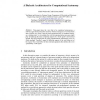Free Online Productivity Tools
i2Speak
i2Symbol
i2OCR
iTex2Img
iWeb2Print
iWeb2Shot
i2Type
iPdf2Split
iPdf2Merge
i2Bopomofo
i2Arabic
i2Style
i2Image
i2PDF
iLatex2Rtf
Sci2ools
ATAL
2003
Springer
2003
Springer
A Dialectic Architecture for Computational Autonomy
This paper takes the view that to be considered autonomous, a software agent must possess the means by which to manage its own motivations and so define new goals. Using the motivational theories of Abraham Maslow as a starting point, we investigate the role that argumentation processes might play in balancing the many competing aspects of a whole agent’s motivational agenda. This is developed into an Agent Argumentation Architecture (AAA) in which multiple “faculties” argue for different aspects of the total behavior of the Agent. The overall effect of these internal arguments then defines the overt “personality” of the agent.
Related Content
| Added | 06 Jul 2010 |
| Updated | 06 Jul 2010 |
| Type | Conference |
| Year | 2003 |
| Where | ATAL |
| Authors | Mark Witkowski, Kostas Stathis |
Comments (0)

